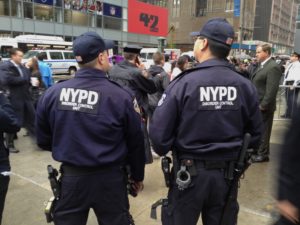
Civil-forfeiture laws were designed to punish criminals by allowing police departments to seize their ill-gotten property. But critics have claimed that departments use the law excessively and seize property without charges or a judge’s ruling. Police departments have a vested interested in making these seizures. Confiscated property is sold at auction and used to buy new, military-grade equipment. Police departments have also been known to seize high-end vehicles from drug dealers and use them for operations.
According to The New Yorker, departments in the majority of states are allowed to even directly pocket money and property obtained from a police encounter. Police have used these laws to fund their departments, without resorting to tax increases.
“The years 2008 to 2014 were some lean economic years,” said Dick Carpenter co-author of the Institute for Justice report in an interview with The New Yorker. “Forfeiture is an attractive way to keep revenue streams flowing when budgets are tight.”
In many cases this practice looks like outright theft. A police officer can seize your cash for any reason and walk away with the money. This is what happened to New Yorker, Harold Stanley. He was stopped outside a McDonald’s in the Bronx and arrested for suspicion of drug possession. Police seized the $1,300 he had in his pocket, which he had saved for his rent. Although Stanley was released a few hours later and the charges were dropped, the police never returned his cash. The New Yorker stated that 87 percent of civil forfeitures end up being dismissed by the courts. Although civil-forfeitures laws were designed to punish big-time criminals, The New Yorker reports the average seizures in New York is $500.
“The majority of arrests are low-level offenses, misdemeanors and below,” said Runa Rajagopal, an attorney at the Bronx Defenders, in an interview with The New York Daily News. “The majority of property taken is likely connected to a low-level charge or offense. We’re not talking yachts or luxury cars. We’re talking cash and old cars.”
The Daily News reported a 134-year old law allows police to seize property of anyone they stop, even for jaywalking. In 2013, New York police seized about $15 million, according to the Office of Management and Budget. The Daily News said that in 2013 about $5,000 obtained from a seizure ended up in the New York Police Department’s pension fund, despite a 1995 court decision banning the practice.
However, two New York City councilmen have introduced a bill that would require the NYPD to give a full accounting of items it has seized. The bill, introduced by Bronx Councilman Ritchie Torres and Manhattan Councilman Daniel Garodnick, would require the police to explain how much money they have taken in from seizures and detail how the money was spent. Torres said seizures unfairly impact low-income people who can’t afford to hire lawyers to help them retrieve their property.
“The reality of civil forfeiture is that it penalizes poverty,” said Torres.“Constitutional rights are reserved only for those who can afford it.”

